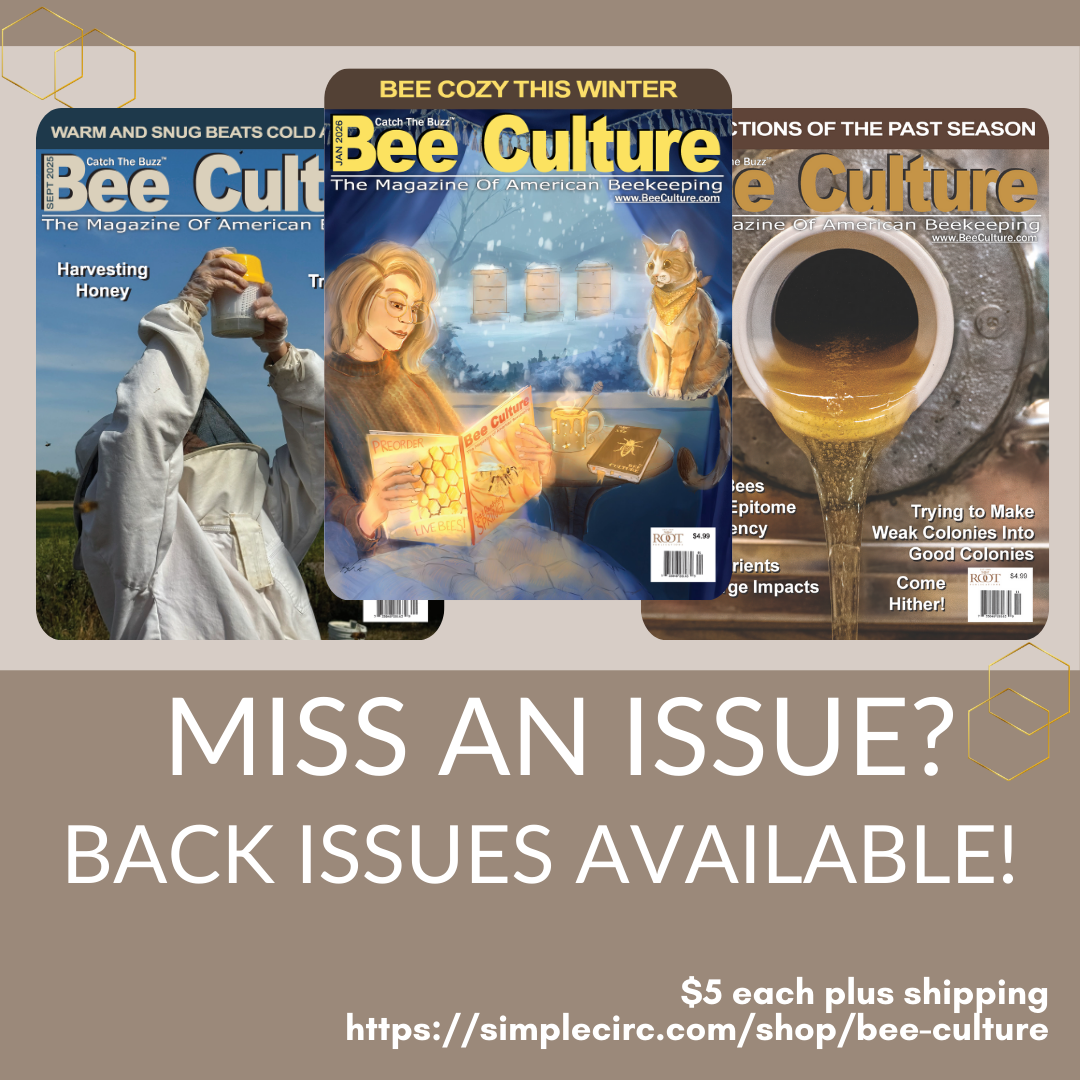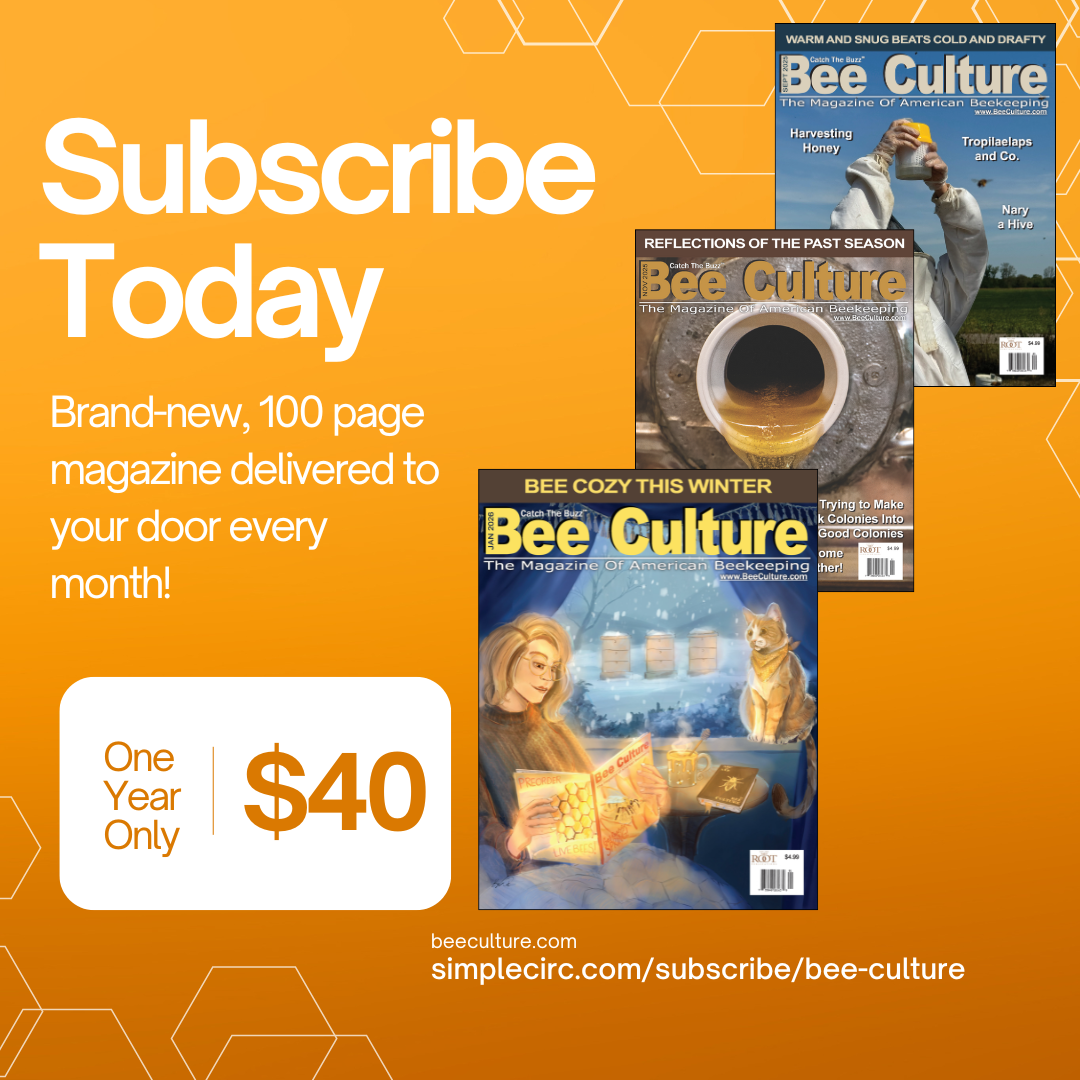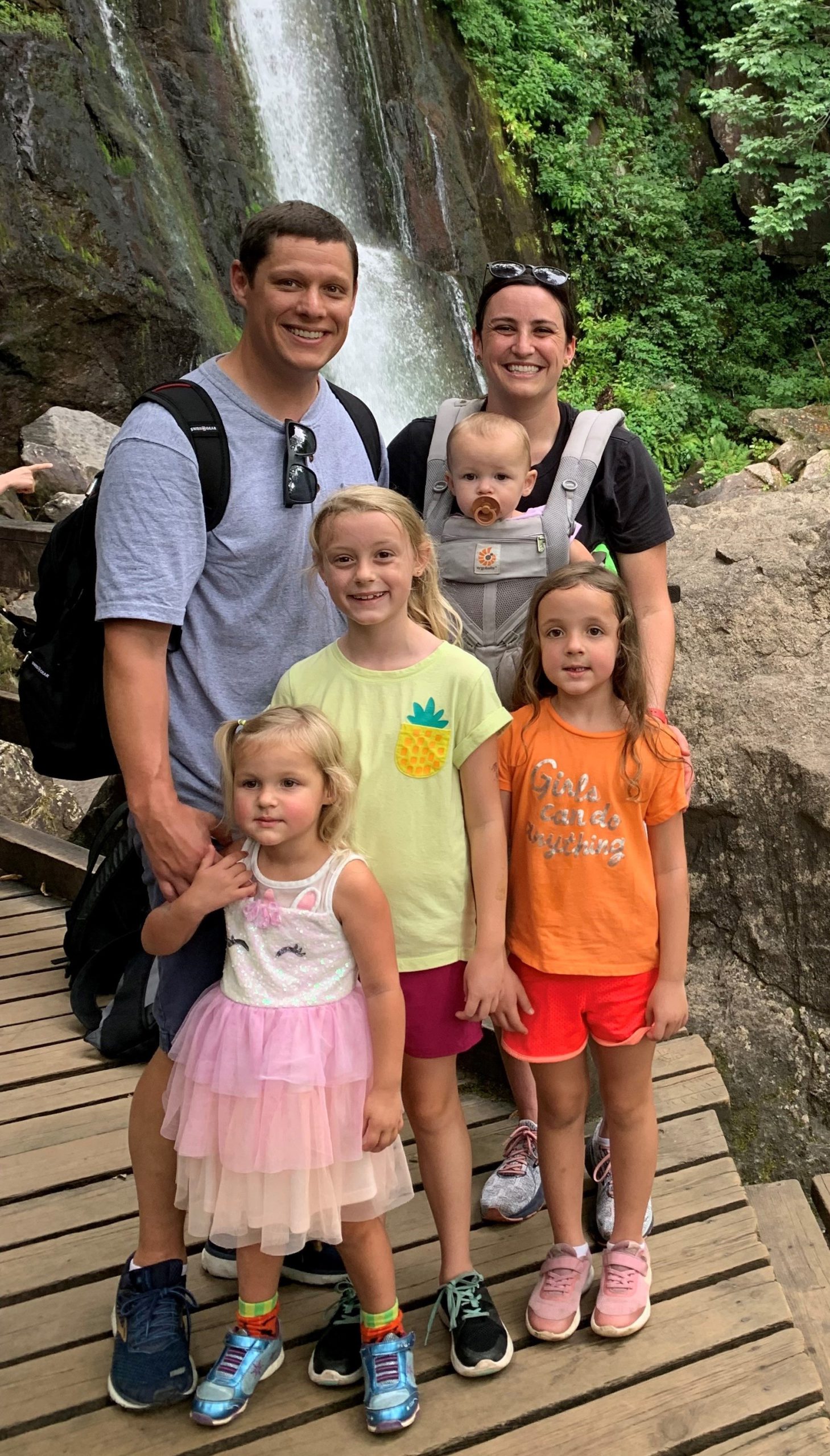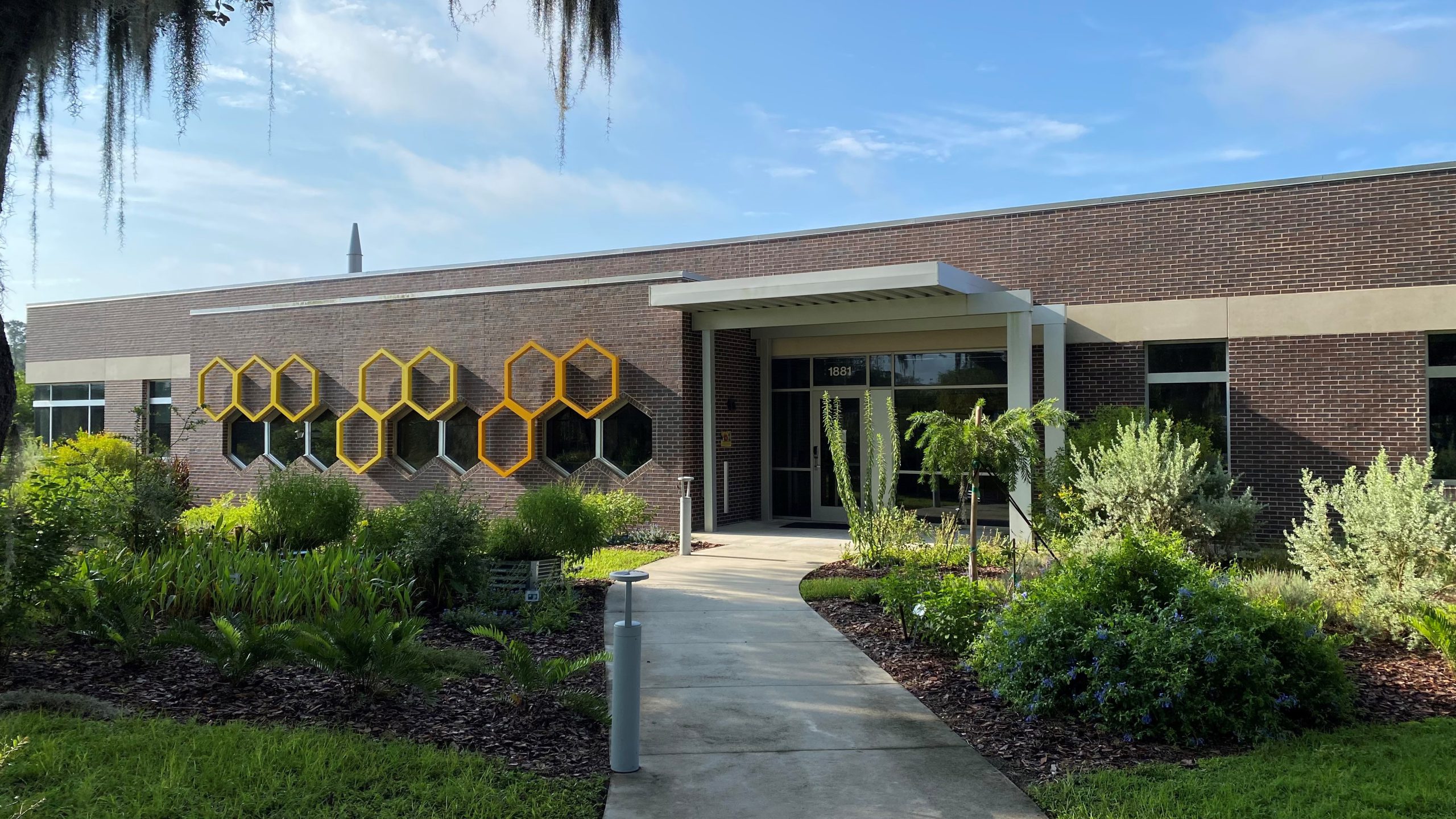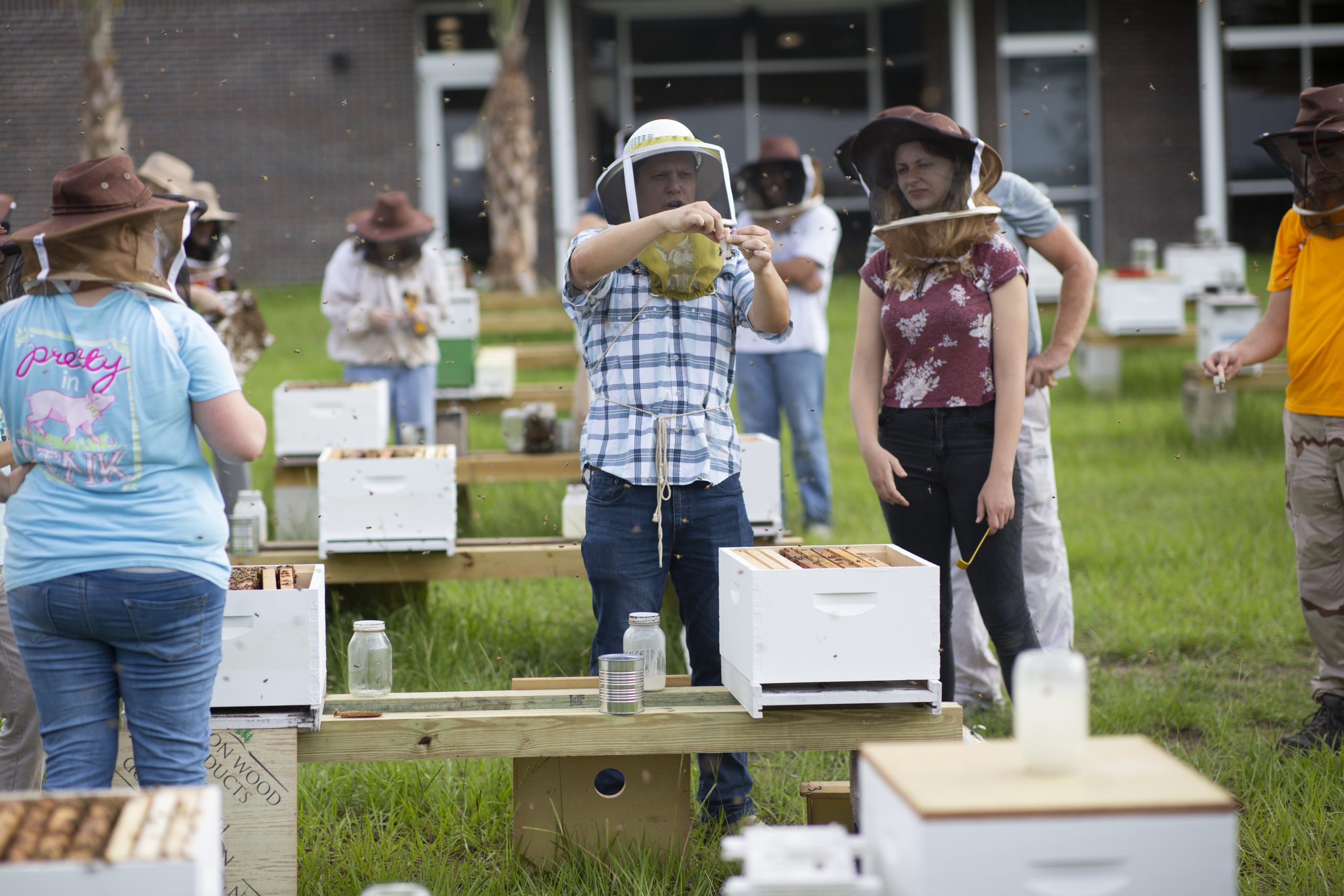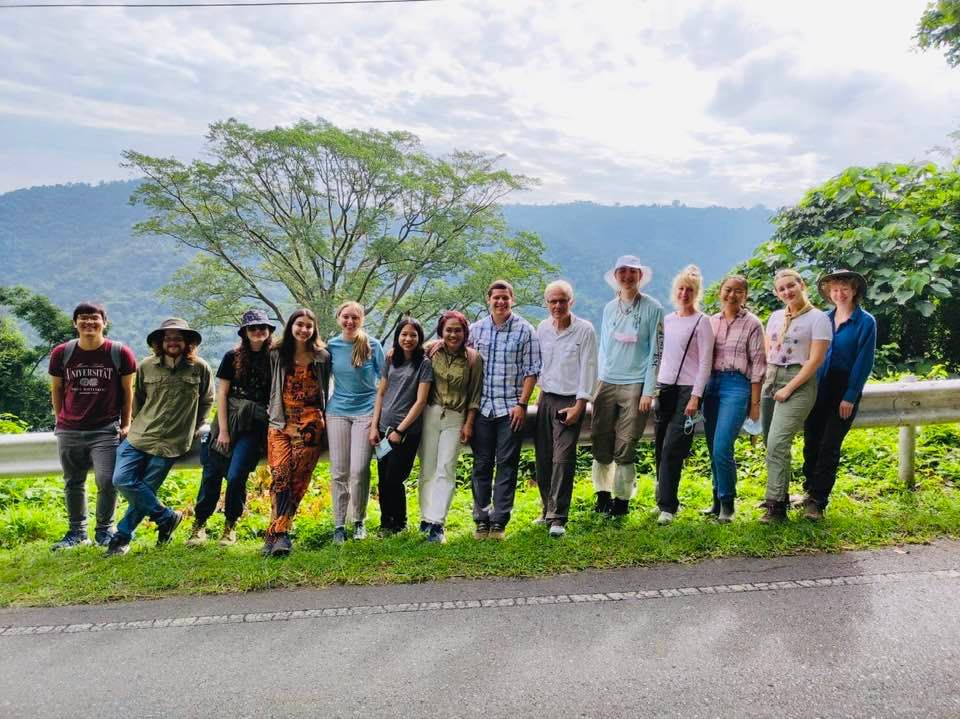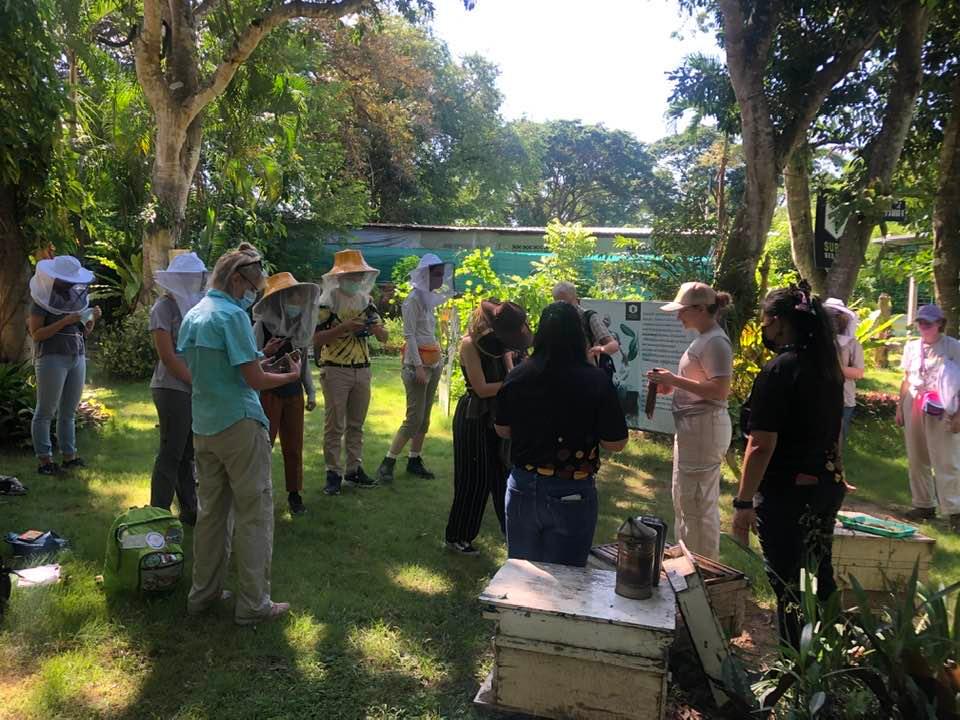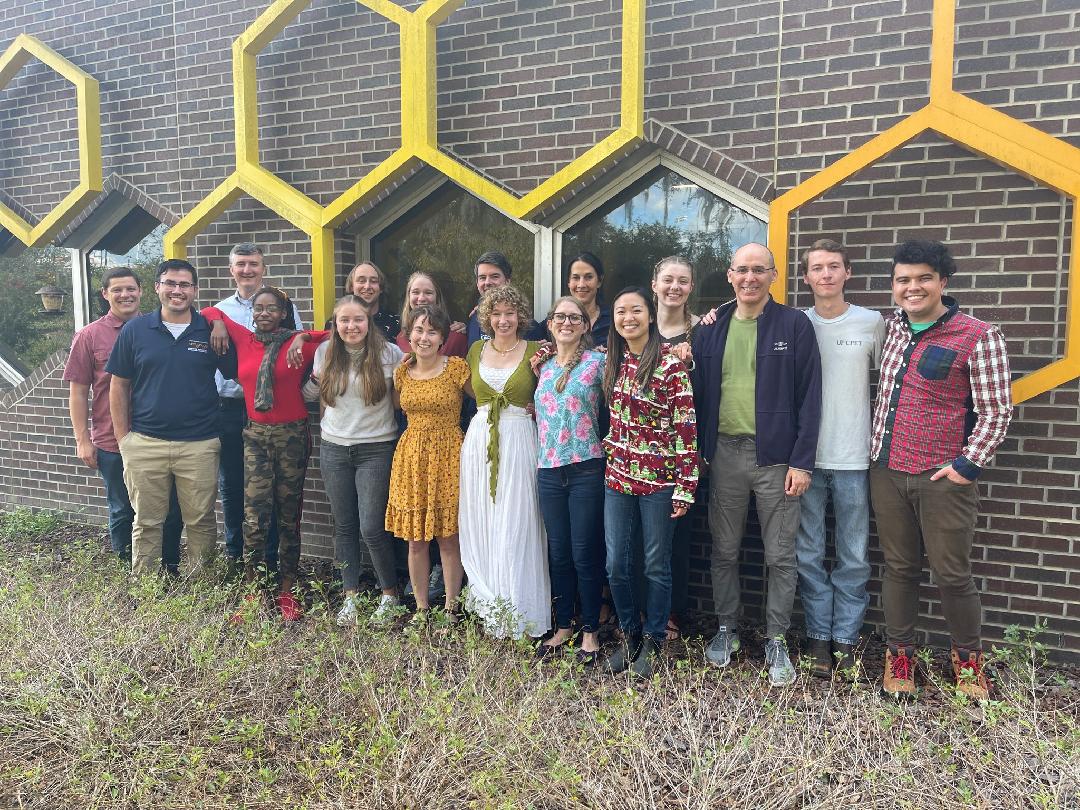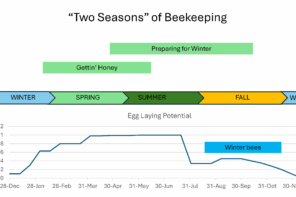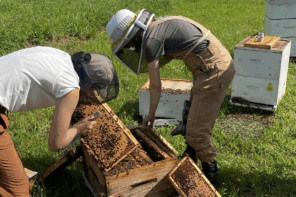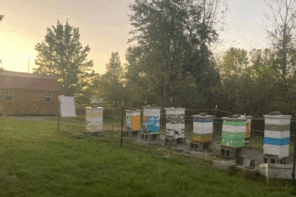From the University of Florida Honey
Bee Research and Extension Laboratory
The University of Florida Honey Bee/Beekeeping Teaching Programs
Cameron Jack
January: Overview of the HBREL at UF
February: Honey Bee/Beekeeping Teaching Programs
March: Research on Honey Bees
April: Apiculture Extension (Part 1)
May: Apiculture Extension (Part 2)
June: Roles in a Typical Honey
Bee Lab
July: How Labs are Funded
August: The Lab’s Physical
Infrastructure
September: What it Take to Run a Laboratory Effectively
October: Professional Development
in the Lab
November: Members of the HBREL Team and What They Do
December: The HBREL’s Most
Notable Successes/Contributions to the Beekeeping Industry
Hi everyone! As this is the first time I have written an article for Bee Culture, allow me to briefly introduce myself. My name is Cameron Jack (Figure 1) and I work as an Assistant Professor at the University of Florida Honey Bee Research and Extension Laboratory (UF HBREL) (Figure 2). I grew up in a rural farming town called Logandale, NV, just outside of the glitz and glam of fabulous Las Vegas. My Grandpa, with whom I am very close, was a high school principal, but he was also a sideliner, supplementing his income through bees. When I was young, he managed 150-200 hives, occasionally recruiting help from his grandchildren for assistance with honey extraction and a bit of manual labor. I grew up around honey bees and beekeeping, so I like to tell people that “I liked beekeeping before it was cool.” I obtained my bachelor’s degree in biology from Southern Utah University in 2012 and then pursued my master’s degree at Oregon State University under the mentorship of Dr. Ramesh Sagili in 2013. My master’s was my first experience with honey bee research and within the first two weeks the hook was set, and I knew I wanted to pursue a career that revolved around honey bees. After completing my master’s research in 2015, I traveled across the country to work on a Ph.D. at the University of Florida under the mentorship of Dr. Jamie Ellis (who we heard from last month as he introduced our lab’s series of articles). There, I began investigating integrated methods to control the devastating pest Varroa destructor and I have continued this line of research. I have worked as a faculty member in the Entomology and Nematology Department at UF since May 2018.
Okay, now that you know me a little better, indulge me just a moment longer to set the stage regarding the history of formal instructional efforts in agriculture and beekeeping in the United States. Thousands of students each year across the country enter college/university programs related to agriculture. You can go to any Land Grant University (LGU) in the country and select a major related to some agricultural area and become fully immersed in coursework, internships and projects related to that topic. For instance, if you were interested in cattle or dairy production and considered pursuing this as a career, you could choose from dozens of LGUs around the country. Likely you will find an Animal Science department that would provide courses such as: Principles of Agribusiness Management, Careers in the Livestock Industry, Principles of Animal Nutrition, Food Animal Nutrition and Feeding, Genetics of Domestic Animals, Growth and Development of Farm Animals, and finally, you would be expected to have full-time practical work experience at a university ranch or dairy farm. Upon graduation, you would likely seek and obtain employment similar to your school training. It is likely that you would have some professional contacts made through your department faculty, internships and academic advisors to help guide you to employment opportunities. Similarly, if you were interested in growing food, you would join the Agronomy department, take a similar series of courses, do an internship and go into that industry. Then, why do we not see a similar education track for those interested in pollination, honey production or the management of beekeeping operations?
You and I already know that our beloved honey bees play an essential role in agriculture. According to a recent economic value study conducted at UF in partnership with the Florida State Beekeepers Association, the total revenues for Florida beekeeping operations were estimated at $93 million in 20201. This total revenue includes $60 million for sales of honey bee products and $33 million for crop pollination services. The total value for pollination services in specialty crops in Florida was estimated at $8 million and out-of-state pollination services were estimated at $25 million in 2020. Keep in mind that this is only one state, and Florida is not the biggest beekeeping state in the country. If honey bees play such a large role in agriculture, and thousands of students each year are participating in agriculture education programs, why do you never hear of anyone going to school to study beekeeping? Well, I suspect the reason may be shockingly simple. No one has ever demanded it.
The case for beekeeping education
Most LGUs that are fortunate enough to have a honey bee researcher typically want that faculty member to spend the majority of their time on research and extension. Most of these faculty have little to no teaching responsibility. If they do teach a course related to beekeeping, it is meant to give students a thousand-foot view of the subject. Students who complete these courses are often left in amazement about the fascinating world of honey bee colonies and have the warm and fuzzies, dreaming about how fun it would be to start their own hive someday. While these courses serve an important role in informing students about the importance of honey bees, they do not prepare students to go forth in a career in the beekeeping industry. How can we cram all the information necessary to comprehend honey bee biology and beekeeping into a single semester? I would like to echo Vizzini, my favorite character in The Princess Bride, who frequently exclaimed, “Inconceivable!” Therefore, more courses are needed to adequately prepare students for all the challenges associated with the beekeeping industry.
Here at UF HBREL, we offer many courses related to beekeeping and I am excited to tell you more about these in a minute. When I tell others about all the courses I teach, I am often asked if they can come to UF and major in beekeeping. The answer is technically… no. A degree major typically bears the name of the department in which the work was completed. If you were to take our beekeeping courses at UF, your degree would be in Entomology and Nematology, as that is the name of our department. Similarly, you do not minor in beekeeping, as minors, like majors, bear the name of a department. We have a very long road ahead of us before there would ever be a honey bee or beekeeping department at a U.S. university.
Now, as I have spoken to different audiences about the future of beekeeping education, not everyone is excited about it. Some commercial beekeepers ask, “do we even want more beekeepers?” I can certainly understand this point of view. More beekeepers mean more competition for contracts, holding yards and customers. However, consider this thought. Not everyone who receives an education about a specific area starts their own business. How valuable could it be to a commercial beekeeper to hire someone who has beekeeping experience, business management training and scientific know-how? They not only would be valuable in their skill-set, but they may be able to help train other employees and seasonal crews. In many other businesses, employers pay for their employees to go to school or get online training to bring back skills and knowledge to the company. Could this model not also work for commercial beekeepers who routinely hire crews of employees that have little, if any, education related to insect behavior, biology or physiology? I believe that beekeeping education can play a role in improving the current industry climate and I will share with you about our efforts at UF HBREL to create such a program.
Beekeeping education at the University of Florida
Since 2011, Dr. Jamie Ellis, like most other honey bee research/extension faculty with little to no instruction appointment, taught a single online course at UF on beekeeping simply called Beekeeping. For the first few years, enrollment was around 20 students, but students thoroughly enjoyed the course, and its popularity grew. It grew so much that to meet the demand of student interest, he started teaching the course every semester. By 2017, enrollment was nearing 100 students each semester it was offered. Now Jamie, being the apicultural visionary man he is, saw this desire from students to learn beekeeping topics and knowing the plight of the commercial beekeeping industry thought that perhaps a traditional education program could exist for beekeeping at UF. Soon, Jamie began advocating for the College of Agriculture and Life Sciences and the Entomology and Nematology Department at UF to create a unique position, a 100% teaching faculty focused solely on creating a beekeeping education program. To my knowledge, a university faculty position focused entirely on the teaching of college students the ins and outs of beekeeping has never existed before in the U.S.
In 2017, Jamie’s request for a new position was granted by the university and the one-of-a-kind teaching position was announced. At the time, I was two years into my Ph.D. program, but I recognized the uniqueness of this position and decided to throw my name in the ring. After an intense interview process, I was fortunate enough to be offered the job. Immediately upon my hire the next year, I set to work with Jamie and Mary Bammer (HBREL’s Extension Coordinator at the time) to strategically plan a honey bee/beekeeping curriculum. We started by examining the Beekeeping course Jamie had already developed and broke up the individual topics, deciding which topics could be fleshed out with sufficient detail to warrant a separate course. Fortunately, there are so many wonderful books related to beekeeping that choosing what to teach was not so difficult. We drew ideas for beekeeping curriculum from such books as Honey Bee Biology and Beekeeping by Dewey Caron and Lawrence Connor, Storey’s Guide to Keeping Honey Bees by Malcolm Sanford and Richard Bonney, and In Business with Bees by Kim Flottum. The real challenge was to consider how each course would complement one another to sufficiently prepare a student moving through the curricula to be prepared for a career in the beekeeping industry. After five years of course development, I am excited to share with you the ten honey bee/beekeeping courses that we now offer at UF.
Honey bee/beekeeping courses offered at the University of Florida
Before listing all the courses I teach at UF, I want to emphasize first that the herculean task of developing so much teaching material has absolutely been a lab effort and not mine alone. As I previously mentioned, Jamie, Mary and I collectively strategized for days on which courses would be important to create. Mary was instrumental in the editing of the lecture recordings and videos, as well as applying her knack for graphic design to make the courses interesting and beautiful. Additionally, I relied on at least half a dozen other lab members that deserve credit for helping me outline content, assemble presentations, create diagrams and figures, design learning activities and importing class materials in our online classroom system. I sincerely would like to thank all the lab members, students and volunteers who helped in this effort. OK, now, on to the courses that I teach as part of the honey bee/beekeeping curricula as of 2023.
Beekeeping I/Apiculture I:
This course is offered to both undergraduate and graduate students and is taught online every semester (Spring, Summer and Fall) with an average enrollment of ~140 students. This course introduces students to the biology of honey bees and the craft of apiculture by exploring the life cycle of honey bees and evolution of beekeeping. Equipment, techniques, management practices, pollination ecology, economic practices and current issues within beekeeping are also discussed.
Beekeeping II/Apiculture II:
This course is offered to both undergraduate and graduate students and is taught online every Spring semester with an average enrollment of ~40 students. In this course, we provide more depth on topics introduced in Beekeeping I/Apiculture I including beekeeping styles, colony stressors and yearly management. This course also explores issues affecting the beekeeping industry including integrated pest management, pests/diseases, African bees, commercial pollination, queen production, bee removals and pesticides.
Honey Bee Biology:
This course is offered to both undergraduate and graduate students and is taught online every Fall semester with an average enrollment of ~50 students. In this course, we provide an in-depth look into the fascinating world of honey bee biology. We explore topics including honey bee sociality, taxonomy, biogeography, behavior, anatomy, physiology, reproduction, nutrition and genetics. Additionally, these topics are discussed via the paradigms of individual bees and the honey bee superorganism.
The Business of Beekeeping:
This course is offered to both undergraduate and graduate students and is taught online every Spring semester with an average enrollment of ~10 students. This course provides an overview related to the management of a commercial beekeeping operation. In this course, we review the ways to generate revenue in beekeeping, the steps of creating an effective business plan and many of the rules and regulations of which beekeepers need to be aware.
Practical Beekeeping:
This course is offered to undergraduate students only and is taught in-person in Gainesville, FL every Summer semester with an average enrollment of 30 students. The overall course goal is to train students to establish honey bee colonies and manage them to be healthy and productive. To achieve this goal, this class is organized as a combined, hybrid course with online lectures and in-person field experiences. Some of the class experiences include assembling hive equipment, installing packages, queen care, making splits, pest and pathogen diagnosis and treatment, honey production and extraction and the creation of other hive products (Figure 3).
Honey Bees of Asia:
This course is part one of the Beekeeping in Thailand study abroad program (the first two weeks in Thailand) which was taught for the first time to 12 students during the Summer of 2022. It is available to undergraduate and graduate level students, along with a handful of interested beekeepers, should there be enough space. The western hemisphere is home to only one honey bee species, but all other honey bee species can be found in southeast Asia. This course allows students the opportunity to discover the amazing diversity of honey bee species and explore the different environments in which these bees may be found. Students participate in laboratory and field experiences in Thailand to study both the biology and threats to these species. Students are housed at Burapha University in the city of Chonburi and work in the lab of professor Dr. Guntima Suwannapong, who co-teaches this course. This course is taught in conjunction with the Beekeeping in Asia course. (Figure 4)
Beekeeping in Asia:
This course is part two of the Beekeeping in Thailand study abroad program (the last two weeks in Thailand) which was taught for the first time to 10 students during the Summer of 2022. It is offered to the same group of students who participated in the Honey Bees of Asia course. This course allows students to discover the amazing diversity of honey bee species and the different ways in which people manage them. Students in this course are exposed to different styles of beekeeping as they explore different beekeeping operations throughout Thailand. In this course, we visited multiple beekeeping operations and cultural sites in Khao Yai National Park, Chiang Mai, Samui Island, Phattalung and Bangkok. The Beekeeping in Thailand study abroad program will continue every other Summer, with the next courses being taught in 2024. (Figure 5)
Insect Research – Issues in Honey Bee Health:
This course is offered to undergraduate students only and is taught in-person in Gainesville, FL every other Fall semester with an average enrollment of 30 students. This course is designated as a Classroom Undergraduate Research Experience (CURE), meaning that students conduct novel research as part of the course. During this course, students are introduced to important topics in science and provided with an opportunity to conduct publishable research in the field of honey bee health. The goal is to prepare students to join other research teams at UF and feel confident in their abilities to contribute to their desired scientific fields. To achieve this goal, this class is organized as a flipped classroom, offering both online and in-classroom learning experiences.
Insect Toxicology:
This course is offered to graduate students only and is taught online every other Fall semester with an average enrollment of 30 students. While this class is not specifically about honey bees or beekeeping, I included it in this list of courses because 1) I teach it, and 2) I believe that many students will find the content interesting and relevant to beekeeping. This course introduces students to concepts associated with the toxicology, chemistry, formulation, modes of action and metabolism of insecticides. Additionally, this course explores issues affecting the environmental impacts associated with pesticide use and the management of insecticide resistance in the field.
Commercial Beekeeping Internship:
This course will soon be offered to both undergraduate and graduate students every semester. Unlike all the other courses that are lecture-based and include set learning materials accessed by students in a classroom or online environment, this course is an internship. The purpose of this internship is to provide students with on-the-job training from commercial beekeepers located in their area. Interns will spend at least one day/week over the course of the semester completing the beekeeping tasks required by the commercial beekeeper host. Student performance will be evaluated and critiqued by the beekeeper.
If you would like to view the syllabi of any of the courses listed here, please visit our website at www.ufhoneybee.com.
I was once again blessed professionally to move into a more permanent position at UF and I am no longer in a 100% teaching role. I now have a 70% teaching/30% research appointment as an assistant professor. I continue to teach all ten courses listed above, even though my department only asks that I teach five courses with my current appointment, but I truly want these courses to remain in existence to maintain a beekeeping educational program. While I cannot possibly add any more courses to my teaching plate, there are several other courses that I would love to see added to the UF honey bee/beekeeping teaching curricula in the future. Dr. Ellis and I have frequently discussed additional study abroad courses in other locations such as in South Africa studying honey bee biology and evolution or in Brazil studying stingless bee biology and management. Additionally, I would love to see courses related to specific skills like queen rearing or on topics of extreme importance like honey bee nutrition and controlling honey bee pests. Though all these ideas for future courses would be beneficial to students in a beekeeping education program, it would require more faculty to teach these courses. Before we can really advocate more honey bee/beekeeping education faculty at UF, we would likely need to demonstrate the demand of students first.
The case for online beekeeping courses
As you read the descriptions of the honey bee/beekeeping courses offered at UF, you probably noticed that most of these courses are taught online. While traveling across the country and talking about my different courses, I am met with a mixture of reactions upon learning that the majority of courses are taught online. One of the most common objections I hear goes something like “You can’t learn beekeeping at a desk or on a computer. You have to learn it in the field with a mentor and the bees as your teachers.” While I will certainly concede that one cannot simply take a lot of courses and then immediately become a successful beekeeper, there is, in fact, much that can be learned in a classroom, both on campus and virtually. For instance, you do not need to be in a hive to learn the basics of honey bee anatomy and physiology. You can read about beekeeping theory and history. You can listen to lectures about the biochemistry and social behaviors taking place in the colony. I am certainly not discounting the importance of in-hive experiences, only suggesting that you can, in fact, learn much about honey bees and beekeeping in a classroom.
You may be thinking, “Well, what is the use of taking a beekeeping course online since you’re never going to see a real life honey bee?” To address this point, may I say that all the online beekeeping courses require some kind of hands-on experience outside of the classroom. In Beekeeping I, students are required to find a beekeeper near them to shadow or attend some kind of educational beekeeping event. In Beekeeping II, students have to document that they have attended at least three honey bee club meetings somewhere in their area. In the Business of Beekeeping course, students will interview a commercial beekeeper of their choosing to learn more about their business models and strategies.
The main benefit of online courses is accessibility. The demand for a honey bee/beekeeping education program here in Gainesville, FL is too low to justify teaching so many courses and exerting so much effort. Thus, teaching many of the beekeeping courses online allows me to cast a wide net and attract students from around the world to my courses. Online courses are also extremely convenient. There may be some who are interested in pursuing a beekeeping education but are place bound or working full-time. Online courses make it possible for these students to learn at their own pace and access course materials during the time of day most convenient to them. These courses are becoming increasingly popular with commercial beekeepers who have very busy schedules and often work difficult hours. I can provide these students a higher-level of flexibility on assignment submissions because I understand their outside demands better than most other professors. An online training program could significantly benefit commercial beekeepers who might be interested in providing a few of their employees with additional training in a flexible and affordable online program.
I have also heard many people say, “You just can’t get as much out of an online course as a face-to-face course.” In many cases and situations, this is possibly a true statement. However, I have been interested in comparing if this is true for beekeeping courses. I recently made my first attempt at conducting a social science experiment with the help of some professors who regularly do this type of research. Using surveys and quizzes, I compared the understanding of many key beekeeping topics of students in my online Beekeeping I course vs. students in my in-person Practical Beekeeping course. The results were interesting to me and fortunately support the idea that an online beekeeping program can lead to similar outcomes of knowledge gained. After comparing more than one hundred students in these courses, we did not observe any significant differences in knowledge to any of the questions we asked. Furthermore, students in the online course reported just as much eagerness to pursue beekeeping later in life as those that registered for and participated in a face-to-face course. I will be working on writing and publishing this research over the next year. With the addition of this research, there is strong support for the tremendous accessibility and knowledge gained from an online beekeeping education program.
Why pursue a honey bee/beekeeping education at the University of Florida?
Please believe me when I say that I do not want the University of Florida to be the only formalized university beekeeping education program out there. Nothing thrills me more than to witness the rise of beekeeping education programs around the globe, with students becoming trained to handle the challenges facing the industry. It will take demand from students and the industry before this could ever become a reality. Now, let me briefly explain the options we currently offer or will soon offer at UF.
Undergraduate and Graduate level certificate in Beekeeping
A certificate program is like a mini degree. It is specific training in a single subject area, typically involving ~15 credits of required coursework. The Beekeeping certificate at UF will require Beekeeping I, Beekeeping II, Honey Bee Biology and about a dozen other options as electives to choose from to make a total of 15 credits. Many students at other universities that need elective credits take our certificate and then transfer these credits to their home university to complete their degree. In 2022, we were able to create a graduate level beekeeping certificate and sometime in early 2023 the undergraduate certificate should be fully approved and open for enrollments.
Undergraduate degree in Entomology and Nematology
This option represents the “traditional” route of agriculture education. Students living in Gainesville, FL can pursue an undergraduate degree in Entomology and Nematology. In addition to the common core requisites (chemistry, biology, algebra, etc.), students would take honey bee/beekeeping courses along with a few general entomology courses like Principles of Entomology and Insect Classification. In 2023, our department is planning to go live with a 100% online undergraduate degree in Entomology and Nematology.
Non-thesis online master’s degree in Entomology and Nematology
For those students that have previously completed an undergraduate degree within the sciences or have a non-science undergraduate degree, but some relevant science coursework, there is a non-thesis online master’s degree in Entomology and Nematology available. In this program, students can choose to specialize in Beekeeping and take coursework similar to that of the Beekeeping Certificate program, with the addition of other foundational courses, such as statistics, insect ecology, insect physiology, etc.
Traditional M.S. or Ph.D. in Entomology and Nematology
Like all honey bee research laboratories at universities with graduate programs, we also offer graduate assistantships for those interested in pursuing a research-focused degree. This route is not necessarily intended for those who wish to pursue beekeeping as a career, rather it is for students interested in improving the beekeeping industry through research. Funding for these assistantships is competitive, with only one or two new students joining the lab each year.
If you are reading this article, you share, along with thousands of others, a passion for learning about honey bees. Even if you are not interested in pursuing a formal university education in beekeeping, please consider the benefits that beekeeping education could have on the industry. Additionally, consider suggesting the idea of pursuing a formal education in beekeeping to someone interested in bees and starting their university education. I sincerely believe that formal university education on the subject of honey bees and beekeeping will enhance the beekeeping industry in many ways.
We have already witnessed several students go on to important positions in the world of apiculture after taking our courses. Some of these students have moved into state regulatory positions, some have gone on to work for commercial beekeepers, and others have gone on to work in honey bee research laboratories across the world. I am thoroughly convinced that those who participate in honey bee/beekeeping courses can become more competent beekeepers that benefit the industry. Therefore, I encourage more beekeepers within the industry to seek out those graduating from university beekeeping programs for hire. Lastly, I encourage more people to demand that their regional LGU provide a beekeeping education program.
Here at HBREL, we sincerely believe that we are currently in the best situation to teach students, both in person and virtually, about beekeeping. Of course, we are incredibly biased, but after you learn more about our world-class facilities, faculty, students and staff through the coming articles this year, I think you may agree. I sincerely hope that you have enjoyed learning about the efforts being made at UF to teach others about the most fascinating and important insects on planet Earth. I hope that you will join us next month as we hear again from Dr. Jamie Ellis about our research programs at HBREL. (Figure 6)
1Economic contributions of the Florida beekeeping industry in 2020. Court, C. et al. UF IFAS Economic Impact Analysis Program, October 10, 2022


